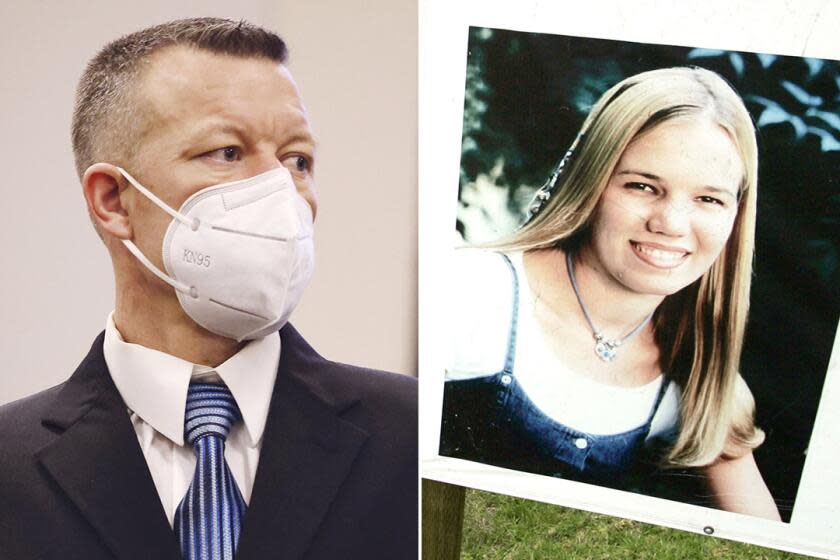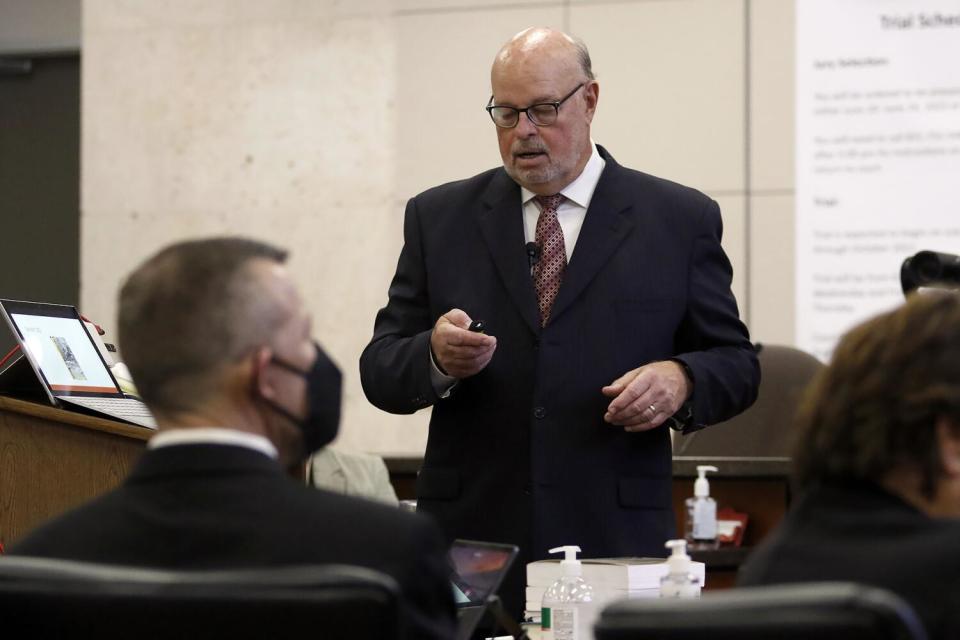Kristin Smart's family sues Cal Poly, accuses it of knowing of killer Paul Flores' history

More than 27 years after Cal Poly San Luis Obispo student Kristin Smart disappeared, her family is suing the university, alleging that its police force ignored multiple reports of suspicious behavior by the Cal Poly student who would prove to be her killer.
Paul Flores, who was the last person seen with the 19-year-old Smart after a Memorial Day weekend party in 1996, was convicted in October 2022 of murdering her. But her body has never been found.
“There is no question that Cal Poly failed our daughter, Kristin Smart, in multiple ways before and after her tragic murder by Paul Flores," the Smart family said in a statement Monday. "Had the university acted properly, conducted a thorough investigation into Flores' past concerning behavior, and implemented appropriate disciplinary measures, Kristin would likely still be alive today."
Smart’s parents, Stan and Denise Smart, her brother, Matthew Smart, and her sister, Lindsey Stewart, asserted in the Superior Court complaint that they did not fully comprehend the university's failure until its president issued an apology in May. Their lawsuit, filed Thursday, alleges negligence, wrongful death and negligent infliction of emotional distress.
The suit also alleges that the mistakes made by university police allowed Flores to rape other women in the years after. The family is seeking unspecified damages.
“Cal Poly’s breaches of its legal duty include but are not limited to the following: It did not pursue a missing person case promptly, did not interview witnesses timely, did not seal the primary suspect’s dorm room as a crime scene, allowed the suspect’s room to be sanitized and cleaned before it was searched, and did not search the suspect’s room until sixteen days after Kristin disappeared,” lawyers for the family alleged in the lawsuit.
The university's police force did not thoroughly investigate in the early stages, dismissing her disappearance and ignoring reports it possessed about Flores' "threatening, stalking, and harassing behavior," the lawsuit asserts. Kristin Smart was last seen walking toward her dormitory with Flores on May 25, 1996.
“If Cal Poly had properly acted on those reports, conducted an investigation, and appropriately disciplined [Flores], he would not have been on campus, and therefore would not have been able to murder Kristin,” the lawsuit alleged.
Smart's disappearance and the murder investigation have haunted the Central Coast college community for decades, with billboards appealing for evidence to convict her killer. She was legally declared dead in 2002.
Two of her friends contacted the university’s police the day after she disappeared. But officers declined to take a report and told her friends they wanted to wait until the Memorial Day weekend was over, according to the lawsuit. They told Smart's mother that Kristin probably went camping, despite her mother's insistence that it wasn't like Kristin to do so, the lawsuit states.
Read more: Kristin Smart case: Images from the investigation and arrest of Paul Flores
In May, Cal Poly President Jeffrey Armstrong publicly stated: "We are very sorry for what the Smart family has endured. What they have been through is unimaginably heartbreaking, and I feel for them in ways I can't express with words. While it is a different administration now than was in place in 1996, we recognize that things should had been done differently — and I personally wish that they had."
The university has declined to comment on the lawsuit, saying it does not discuss ongoing litigation.
The lawsuit alleges that Cal Poly's police force had the following reports about Flores in its possession before Smart disappeared:
In December 1995, a female Cal Poly student filed a university police report alleging Flores had been harassing her, including climbing the trellis of the student’s apartment building to spy on her from her balcony. Cal Poly police apprehended Flores at the location and identified him as the “culprit,” the lawsuit alleges.
In January 1996, Flores was reported for vandalizing Cal Poly grounds and property while intoxicated. That same month, he was required to attend a “Mediation/Information Meeting” because he had allegedly harassed a staff member at the university, according to the lawsuit.
In March 1996, three female Cal Poly students filed reports to university police accusing Flores of harassment and stalking. According to the lawsuit, Flores repeatedly telephoned them for six weeks and filled their answering machine with silent hang-up calls. They, too, alleged that Flores had climbed on their balcony and tried to break into their apartment in December 1995, according to the lawsuit.
In addition, the lawsuit alleges that in December 1994, Flores was arrested on suspicion of assault and battery, and Cal Poly's police department had access to the California Law Enforcement Systems database that includes those records.
“After becoming aware of five reports of Flores’ harassing, stalking, and violent behavior, any reasonable university would have engaged in a disciplinary process related to Flores,” according to the lawsuit. "A reasonable university would have expelled, or at least suspended, Flores.”
The Smarts' lawsuit said Cal Poly’s failures allowed Paul Flores to sexually assault and hurt multiple women during the 25 years leading up to his April 13, 2021, arrest. Two of those women testified they were drugged and sexually assaulted in Los Angeles County in 2008 and 2011, respectively.

In their cases, the prosecutor noted Flores had offered to give the women rides home after meeting them, only to drug and repeatedly rape them at his house.
Flores is serving 25 years in prison. Last year, a group of scientists revealed data that they say showed indications of human remains in the soil of his mother's property.
This story originally appeared in Los Angeles Times.

